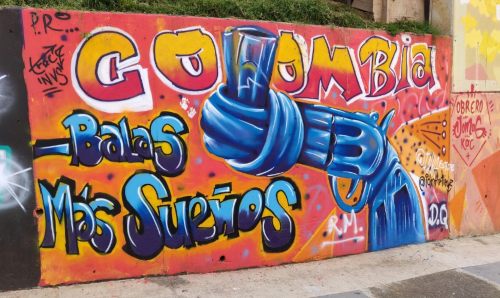International Consortium for Conflict Graffiti (ICCG)
Researching graffiti and street art in conflict-affected societies.

A consortium of researchers, led by The University of Manchester in collaboration with the University of Waterloo in Canada and the Stockholm International Peace Research Institute (SIPRI) in Sweden is currently developing a research agenda concerning the role of street art and graffiti in conflict-affected societies. Together they founded the International Consortium for Conflict Graffiti (ICCG) that is hosted at the Humanitarian and Conflict Response Institute.
ICCG’s aim is to better understand what we can learn from visual arts in conflict-affected societies. Street art, and graffiti, in particular, represents a diverse range of artistic, social, cultural, and political practices in urban landscapes, whereby people publicly mark their different intentions with potential impacts on communities.
Street art can be both a contributor to, and commentary on, contested spaces, and thus produces spatial realities in dynamic and temporal ways. It provides rich insight into societies, cultures, social and economic issues, trends and political discourse, as well as spatial and territorial identities and claims. Thus, understanding street art in societies undergoing social and political transformation can be an important resource for both academics and policymakers as it furthers knowledge of everyday peace and conflict practices, and contributes to our understanding of local experiences.
ICCG exhibition
ICCGs first exhibition was launched in February 2020 and shows street art from Colombia, Cyprus, Hong Kong, Iraq and Timor Leste. If you are interested in hosting the exhibition or a talk, please contact us. It is also possible to visit the online exhibition "Your walls can(not) divide us".
Project team/contact
- Manchester-based researchers: Catherine Arthur, Billy Haworth, Birte Vogel
- International team: Eric Lepp (Waterloo); Dylan O’Driscoll (SIPRI)
- For general queries contact iccg@manchester.ac.uk
- Follow project updates on Twitter @congraffiti
Publications
- Vogel, B., Arthur, C. Lepp, E., O'Driscoll, D. and Haworth, B. 2020. Reading socio-political and spatial dynamics through graffiti in conflict-affected societies. Third World Quarterly.
- Haworth, B.T., Arthur, C. & Lepp, E. (2019). Graffiti in Cyprus paints a rich and complex picture of this divided society. The Conversation.
